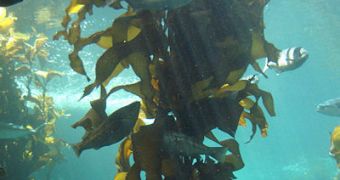Coming up with an economically-sustainable alternative source of fuel is no easy task, and most existing methods of synthesizing such compounds either take up too much space, or are grown instead of crops that could have the potential of feeding a lot of people. Now, researchers in South Korea have managed to devise a method of obtaining ethanol that is both very safe and highly productive, while not taking up any space at all to grow. Their system isn't even designed to cover land that is otherwise useless to agriculture or other crops.
In addition, their patent application refers to all types of algae, not just specific ones, as those current processes need. The main secret behind their revolutionary technique is a certain enzyme, which has the capacity of breaking down the algae into simple sugars. As we all know, that's the stuff ethanol is made off, and a simple fermentation process is all that is required in order for that to happen.
Also, by using this new technique, the price of food would not be influenced. This happens in the case of biofuels grown on soils that could have otherwise been covered by potatoes or corn, or any other crop. Because it doesn't take up any space on the ground, the new process can be fairly cheap. All someone would need in order to to produce ethanol would be a very large bowl, some algae, the enzyme, as well as gas-trapping equipment and pressurization devices, so as to bottle the biofuel.
Furthermore, because algae grow in their natural habitat, underwater, they develop very fast, and can be harvested approximately 5-6 times per year, which would lead to a considerably increased efficiency, as opposed to waiting for potatoes to grow in rough soil, once a year. Another great advantage that algae have is the fact that they do not contain lignin, like the wood does, which means that they don't have to be treated with chemicals before being processed.
They can also store up to seven times more carbon dioxide (CO2) than wood can, but have at the same time a much lower impact on the environment, as far as processing technologies go. If the patent request is approved, we could see the appearance of such production plants in places where algae grow very tall in the water and prevent people from enjoying the beaches.

 14 DAY TRIAL //
14 DAY TRIAL //